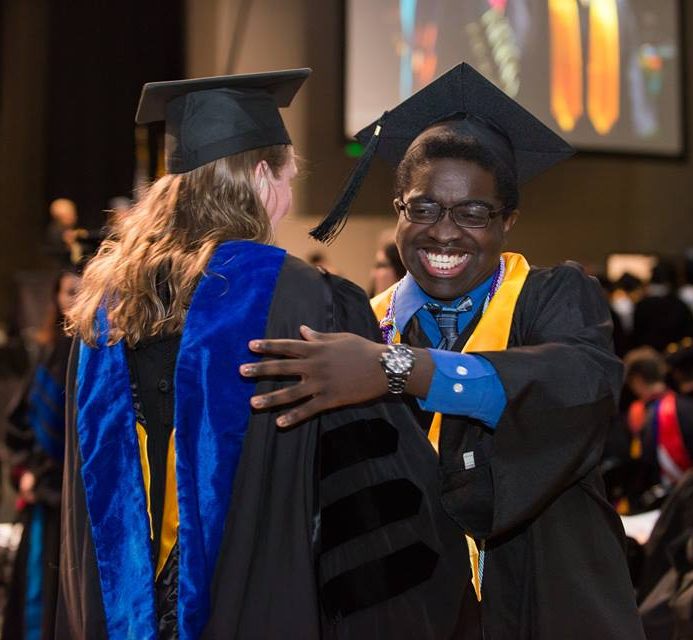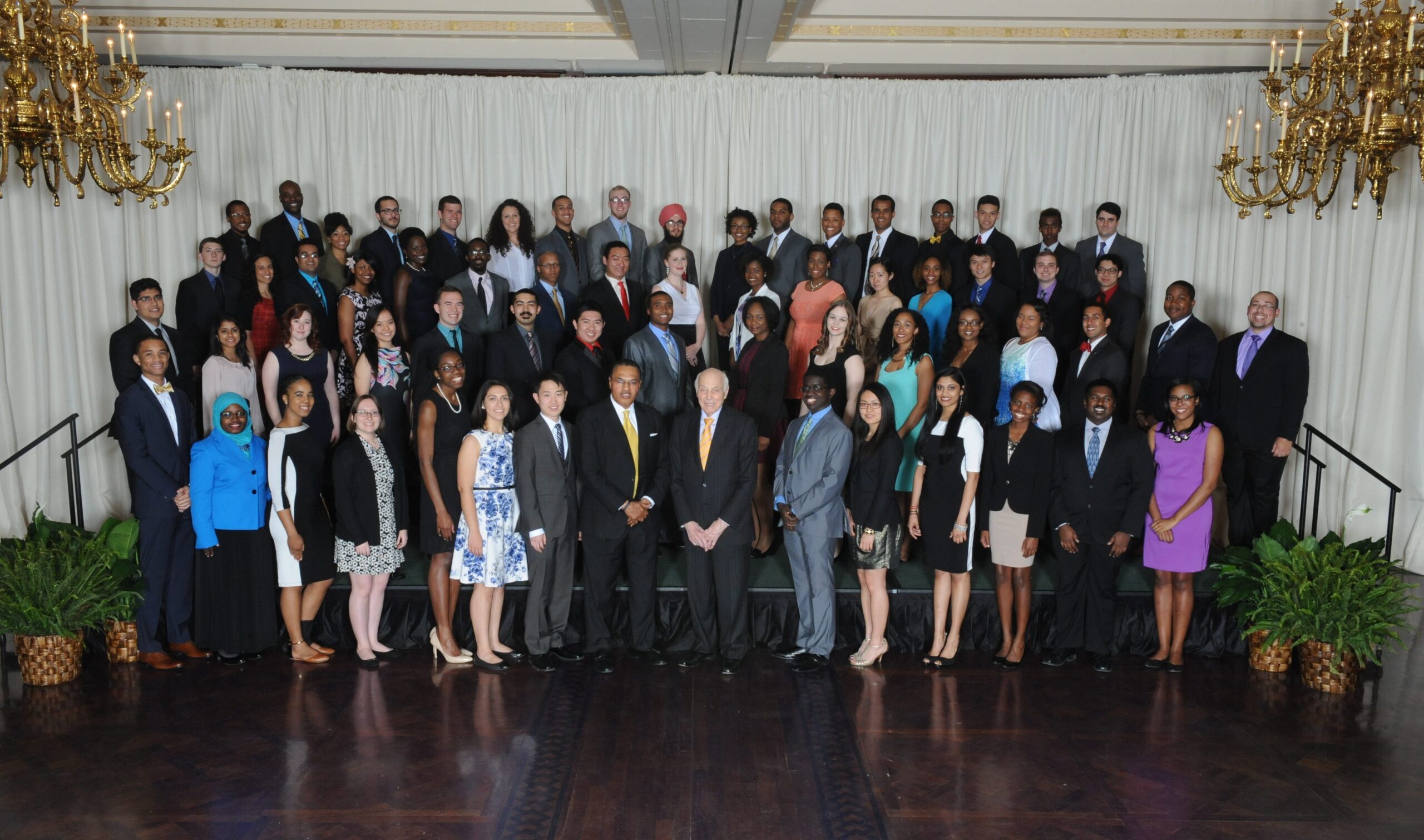UMBC’s Meyerhoff Scholars Graduation Dinner, held April 13, 2016, served as a meaningful bookend to a life-changing college experience for 66 class of 2016 graduates. The Meyerhoff Scholars Program “is something that has to be lived,” says program director Keith Harmon. “We address the scholar, but we also address the whole person.”
The annual graduation dinner is an opportunity to celebrate the accomplishments of each Meyehoff Scholar and the transformative impacts of the program, described by Science as “the gold standard for providing a path into academic research for groups…now underrepresented in the STEM (science, technology, engineering, and mathematics) fields.”
The program is known for fostering in scholars a sense of perseverance, spirit of community and support, and devotion to excellence and integrity—qualities that they will carry with them throughout their lives and careers—starting on day one of Summer Bridge before freshman year.
Meyerhoff alumni Kafui Dzirasa ’01, chemical engineering, and Erica Childs ’05, mathematics and statistics, spoke at the event, reflecting on their UMBC experiences and sharing their paths since graduation.
 Dzirasa received his M.D. and Ph.D. at Duke University and is now an assistant professor of psychiatry and behavioral sciences at Duke. He recently received the Presidential Early Career Award for Scientists and Engineers (PECASE), the highest honor that the U.S. government presents to science and engineering professionals in the early stages of their research careers. A new PBS documentary on bipolar disorder just featured Dzirasa’s research to develop brain stimulation treatments that target disordered neural circuits, as opposed to medications that can have undesirable side effects on other areas of brain function.
Dzirasa received his M.D. and Ph.D. at Duke University and is now an assistant professor of psychiatry and behavioral sciences at Duke. He recently received the Presidential Early Career Award for Scientists and Engineers (PECASE), the highest honor that the U.S. government presents to science and engineering professionals in the early stages of their research careers. A new PBS documentary on bipolar disorder just featured Dzirasa’s research to develop brain stimulation treatments that target disordered neural circuits, as opposed to medications that can have undesirable side effects on other areas of brain function.
Childs earned her Ph.D. at UCLA and now is a research associate at the Johns Hopkins University Bloomberg School of Public Health. She uses her statistics expertise to identify genes that are risk factors for various diseases and develop risk models for cancers.
Harmon sees nurturing the dreams of Meyerhoff Scholars as the heart of the program—concluding every meeting with a reading of Langston Hughes’ “Dreams”—and the program’s focus on mentorship and supportive community has paid off.
“The program has turned my undergraduate career into so much more than four years of classes,” says Julian Sass ’16, mathematics and statistics. “It has turned into a strong foundation for my personal growth and success. The program has changed my life and inspired me to dream bigger.”
 Gaurav Luthria ’16, bioinformatics, worked to find his passion among many possible research fields. “Working on various research projects, participating in hackathons, and learning from my professors at UMBC has been invaluable in shaping my career aspirations,” he says.
Gaurav Luthria ’16, bioinformatics, worked to find his passion among many possible research fields. “Working on various research projects, participating in hackathons, and learning from my professors at UMBC has been invaluable in shaping my career aspirations,” he says.
Randi Williams ’16, computer engineering, particularly appreciated op portunities to develop confidence and leadership as a Meyerhoff Scholar. She says, “UMBC groomed me into a leader, which, as a shy and nerdy freshman, I never imagined I could be.”
portunities to develop confidence and leadership as a Meyerhoff Scholar. She says, “UMBC groomed me into a leader, which, as a shy and nerdy freshman, I never imagined I could be.”
As one of few women in computer engineering, Williams relied on her Meyerhoff cohort for support her freshman year. By junior year she was mentoring freshman Meyerhoff Scholars. “It meant a lot to me to give back to other African-American women,” she says.
Williams completed internships at the NASA Jet Propulsion Lab, MIT Media Lab, and tech company Jawbone as an undergraduate. She will next head to MIT for a master’s degree in media arts and sciences. “I don’t think I would be in this position without the academic preparation, networking, internships, and leadership skills that I was able to hone as a Meyerhoff,” she says.
 “The focus on research, academic success, and mentoring helped shape me not only as a student, but also as a person,” Sass adds. “We learn during Summer Bridge that we are all accountable for each other’s success, and I internalized that.”
“The focus on research, academic success, and mentoring helped shape me not only as a student, but also as a person,” Sass adds. “We learn during Summer Bridge that we are all accountable for each other’s success, and I internalized that.”
UMBC is now the nation’s #1 producer of African American undergraduates who go on to complete M.D./Ph.D. programs and the Meyerhoff Scholars Program is being adapted at UNC-Chapel Hill and Penn State through a $7.75 million HHMI grant. But for the 66 Meyerhoff graduates of the class of 2016 it’s not about national stature, it’s personal. Harmon wants to make sure that each and every graduate will “hold fast to dreams.”
Header image: Meyerhoff Scholars Class of 2016; photo by Jim Burger.
Other images, top to bottom: Kafui Dzirasa ’01, photo by Les Todd, Duke Photography; Gaurav Luthria, Randi Williams, and Julian Sass, photos by Marlayna Demond ’11 for UMBC.
Tags: CNMS, COEIT, MeyerhoffScholars

